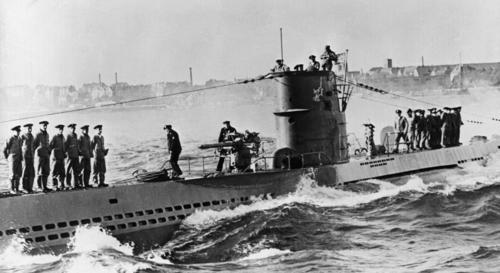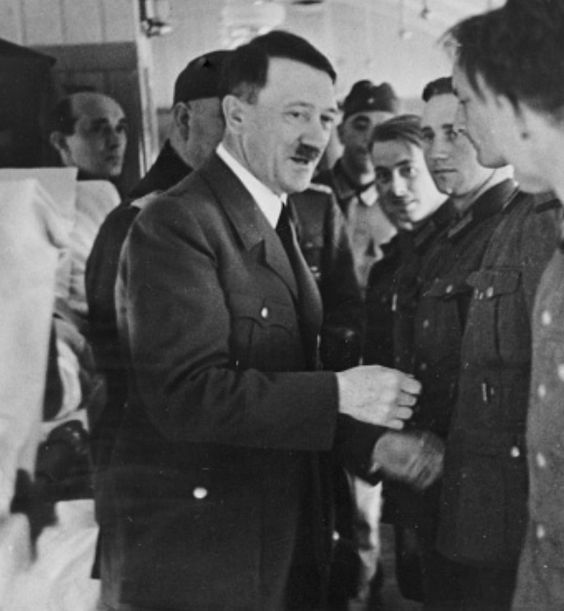Tuesday 10 December 1940
 |
| An Italian POW carries his dog into captivity, guarded by a British soldier. 10 December 1940. |
With Selby Force blocking any retreat, the Italian 4th Blackshirt Division 3 Gennaio and two Italian Libyan Divisions must while away another night in the pocket without any food, water or shelter. The British troops are held up more by a sudden sandstorm than by anything the enemy is doing. The British don't even know how many Italian prisoners they have caught: the Coldstream Guards report simply that there are hundreds of acres of prisoners. General Wavell in Cairo, satisfied that the Italians no longer pose a threat, begins withdrawing troops to send south to Sudan. There, he hopes to terminate the endless back-and-forth around the border outpost of Kassala.
The RAF also is very active today, particularly in harassing Italians retreating along the coast road to Libya. Force H sails from Gibraltar to help out as well.
In the Gulf of Aden, Royal Navy light cruiser HMS Southampton bombards Kismayo, Somalia. Japanese 5028-ton freighter Yamayuri Maru is damaged. This may be the first Japanese ship damaged by a western power during World War II.
Italian 5257-ton freighter Marangona hits a mine and sinks 50 km south of Pantelleria. It apparently hit an Italian mine.
German freighter Marburg hits a mine and sinks northeast of Ithaca, Greece in the Ionian Sea.
Italian/Greek Campaign: The Greeks continue slogging through the snow in the mountains, with Greek II Corps capturing the high ground northwest of Pogradets. The RAF raids the port of Valona (Vlorë).
European Air Operations: RAF Bomber Command sends a small raid of four Blenheims against the Focke-Wulf plant at Bremen. The RAF also bombs several invasion ports along the Channel coast. The Luftwaffe sends a few desultory raids into East Kent and Esses.
Fliegerkorps X transfers from Norway to Sicily and southern Italy. This force includes Junkers Ju 87 Stukas and is under the command of General Hans Ferdinand Geisler. His first priority, according to Hitler: "Illustrious mussen sinken" ("Sink HMS Illustrious"). The force will include about 100 aircraft, most based at Comiso and Catania.
Tory Member of Parliament John Rathbone, serving in the RAF as a Flight Lieutenant, is killed in the Bristol Blenheim Mark IV bomber he is piloting on a mission over Antwerp. He is buried at Schoonselhof cemetery, Antwerp, Belgium. Rathbone is the sixth MP to be KIA during the conflict.
 |
| John Rathbone's 1935 election address, KIA 10 December 1940. |
287-ton Faroes trawler Tor I hits a mine and sinks in the North Sea.
German 109-ton freighter Thor sinks near Cherbourg. This is not the famous German raider Thor (Schiff.10), which is operating in the South Atlantic with Admiral Scheer. This Thor apparently sinks during a sweep by Royal Navy destroyers.
Convoy FN 356 departs from Southend, Convoy FS 358 departs from Methil, Convoy HX 95 departs from Halifax.
Minesweeper HMAS Ballarat launched.
U-125 launched.
Battle of the Indian Ocean: Captain Bernhard Rogge of the German raider Atlantis receives a signal from Berlin informing him that he has been awarded the Ritterkreuz (Knight's Cross). The Atlantis is currently refueling with the Pinguin from captured Norwegian tanker Storstad in the southern Indian Ocean.
Spy Stuff: Karl Heinrich Meier and Jose Waldberg are executed in the Pentonville Prison in London. Both had been convicted of spying at the Old Bailey in November. Meier is a Dutchman of German origin who was caught by a suspicious landlady at the Rising Sun Pub in Lydd after rowing ashore in Kent. Waldberg, a native German, claimed that he had been coerced into cooperating with the Germans due to Gestapo pressure on his father. These are the first two executions under the Treason Act.
US/Japanese Relations: President Roosevelt expands the list of items that cannot be exported without a license - which currently includes oil and scrap metal - to encompass steel and iron.
Anglo/Chinese Relations: The British government extends a $40 million loan to China. This is quite generous, as the British themselves are running out of money.
Fuhrer Directive No. 19 is telling in another way. Hitler realizes, given the obstinacy of Francisco Franco in Spain, that trying to convince other European leaders not yet under his thumb to cooperate in his war effort isn't working. Thus, he must plan to resort to force with them. This is one of the few Hitler Directives that essentially will be carried out as stated, but he much rather would have France with him than against him.
Separately - and not in Hitler's Directive - General Wilhelm Keitel issues an order announcing that Operation Felix, the planned subjugation of Gibraltar, is suspended indefinitely. Hitler, having read Admiral Canaris' negative report about his meeting with Franco on 7 December, has decided that Operation Felix cannot be pursued due to Spanish unwillingness to cooperate.
Taken in conjunction, this order and the Fuhrer Directive show how much things have changed since October when Hitler was hopeful that Petain and Franco would join in his war against England. Now, there appears to be no hope of that. Backroom planning for Operation Felix remains alive, however, until 1944.
US Military: The US Navy opens NAS Tongue Point, Oregon. It will service patrol planes.
Polish Military: Marshal Rydz-Smigly escapes from captivity in Romania and heads for Hungary to join the Polish underground there.
German Homeland: Even during 1940, which many consider the peak of German military success, Adolf Hitler repeatedly adopts a defensive tone. Today, he gives a speech at a Berlin munitions plant and says:
I am not a man who, once he is engaged in a fight, breaks it off to his own, disfavor.... [T]here will be no defeat of Germany, either by military or economic means, or by time.It is a remarkable statement, full of foreboding, and sounds as if it were made in 1945, not 1940.
American Homeland: The NFL Draft is held. NFL Champions the Chicago Bears select Tom Harmon of the University of Michigan with the number one overall pick.
The Benjamin Fitzpatrick Bridge opens, connecting Tallassee and East Tallassee, Florida.
December 1940
December 1, 1940: Wiking Division Forms
December 2, 1940: Convoy HX 90 Destruction
December 3, 1940: Greeks Advancing
December 4, 1940: Italian Command Shakeup
December 5, 1940: Thor Strikes Hard
December 6, 1940: Hitler's Cousin Gassed
December 7, 1940: Storms At Sea
December 8, 1940: Freighter Idarwald Seized
December 9, 1940: Operation Compass Begins
December 10, 1940: Operation Attila Planned
December 11, 1940: Rhein Wrecked
December 12, 1940: Operation Fritz
December 13, 1940: Operation Marita Planned
December 14, 1940: Plutonium Discovered
December 15, 1940: Napoleon II Returns
December 16, 1940: Operation Abigail Rachel
December 17, 1940: Garden Hoses and War
December 18, 1940: Barbarossa Directive
December 19, 1940: Risto Ryti Takes Over
December 20, 1940: Liverpool Blitz, Captain America
December 21, 1940: Moral Aggression
December 22, 1940: Manchester Blitz
December 23, 1940: Hitler at Cap Gris Nez
December 24, 1940: Hitler at Abbeville
December 25, 1940: Hipper's Great Escape
December 26, 1940: Scheer's Happy Rendezvous
December 27, 1940: Komet Shells Nauru
December 28, 1940: Sorge Spills
December 29, 1940: Arsenal of Democracy
December 30, 1940: London Devastated
December 31 1940: Roosevelt's Decent Proposal
2020













